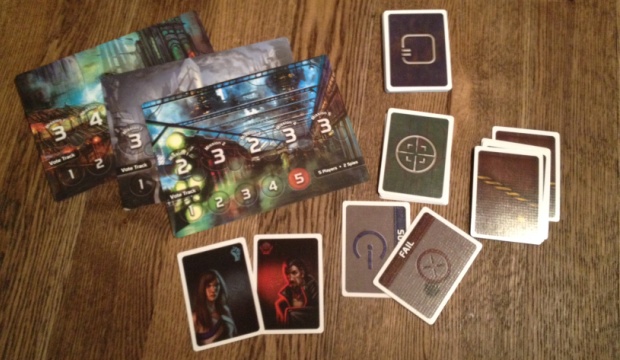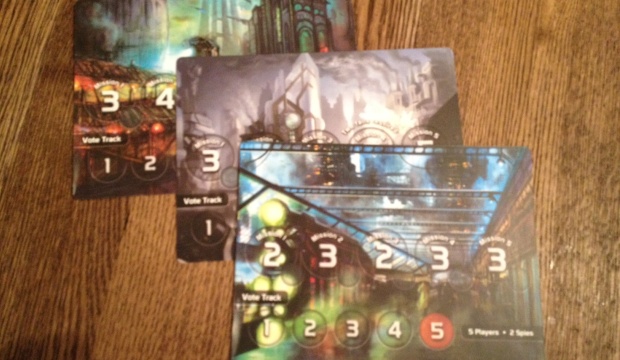The Resistance Review
The Resistance is a social deduction game that pitches you against your friends as you attempt to overthrow a corrupt government. You take of the role of the titular Resistance, performing missions to achieve your goal, the twist being that some members of your group are spies who can undermine your efforts.
The setup sees players randomly taking a role card, either Resistance or Spy. Everybody then closes their eyes and the spies can check who their colleagues are. As a group, a series of missions must be undertaken, with a randomly selected leader picking a “Mission Team” from the other members. Everybody then either approves or rejects the team, based on their own goals. As a Resistance operative, you’ll want to prevent spies joining the team, as they can sabotage the mission, while spies obviously want themselves or another spy on the mission. The mission is then undertaken, with the team members anonymously voting to either succeed or fail it, with just one failure enough to scupper the mission. A new round then begins, with a new leader and it is rinsed and repeated until three missions have succeeded or have been sabotaged.

The interest comes from the dialogue while you’re playing. As the Resistance you’ll need to keep an eye out for suspicious behaviour, and you’ll be able to build a picture of who’s a spy and who isn’t based on what succeeds and what fails. As a spy you’ll naturally need to blend in, occasionally going with the crowd on group votes, or passing a mission to move suspicion onto somebody else. It’s fun deducing who’s what as you play, and you’ll quickly learn which of your friends is the best liar, and the concept as a whole is something I really enjoyed. The dark sci-fi setting is also cool (although a King Arthur-inspired version is available, called Avalon).
Presentation wise, things are pretty good as well. The cards continue the grimy futurism vibe, whilst the cardboard voting markers are chunky and will hold out well for lots of games – you won’t look at the pack and know that’s the reject token with the bent corner.
The box also contains an expansion called The Plot Thickens. It introduces plot cards to mix things up. Only a few are brought into play during each round – one for five to six players for example – but they can have a profound effect, looking at another player’s plot card or being forced to show yours, and even stealing the leadership. It’s best to play at least a few vanilla games first though.

The only real issue I have with The Resistance is the player count: at least five people are needed to play. I mostly do these reviews with a group of friends, who fully know that they’re coming round for a board game evening, yet it was a struggle to get even them to play this with me. With this is mind, finding four people who’ll like the concept and the premise to play with you might be a little difficult – it doesn’t have the universal appeal of, say, Monopoly.
You could argue that matters are weighed too heavily in favour of the spies – the rulebook even admits they’ll win most of the time – but a central part of The Resistance is outwitting the spies, picking up on their voting patterns or inconsistent arguments.
VERDICT: The closest I’ve come to playing something like The Resistance is a few murder mysteries, where you’re given a role to perform. This isn’t as complex, but working out who are spies while maintaining trust in yourself is just as satisfying, while playing as a spy is wonderfully tense and requires a brilliant poker face. You need quite a few committed friends to play this with, but if you’ve got some then I heartily recommend The Resistance.





